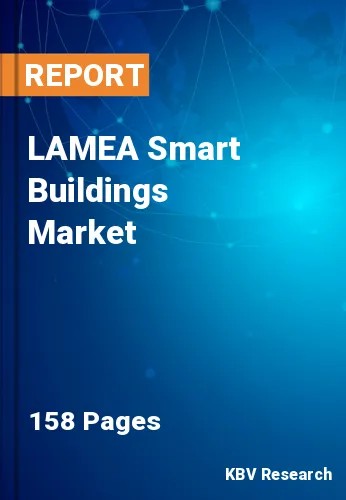The Latin America, Middle East and Africa Smart Buildings Market would witness market growth of 13.2% CAGR during the forecast period (2021-2027).
Suppliers of smart building systems are using new arrangements of sensor and automation technologies. The most severe drive to the development of the smart buildings market possibly came from the advances made in digitalization to minimize the ecological footprint in the smart buildings business. This is achieved by the falling prices of a broad variety of smart building technology. Another convincing argument for facility managers to invest in smart buildings seems to be the lower return on investment.
The number of smart buildings is expected to increase as the number of smart energy systems rises. New advancements in the smart buildings market are projected to be fueled by an unwavering commitment to improving sustainability, access, efficiency, and comfort. Technology enterprises that are primarily focused on developing the IoT foundation of smart buildings are paving the way for smart building market innovation that can boost the compatibility of smart building technology.
There are numerous projects and initiatives taking by governments across this region, which is one of the major factors escalating the growth of the regional market in the coming years. Smart buildings contain structured wiring which enables owners to control various electronic household appliances from a remote place. These electrical devices can be programmed with a single, straightforward instruction. With the advent of smart buildings, homeowners may now control their entertainment systems, control their house or building lighting systems, turn on and off home appliances, and do a variety of other functions. Smart buildings help to reduce operational expenses, carbon emissions, and energy consumption. Owing to the increased need for electricity smart building solutions, the Middle East is experiencing high growth in the smart buildings market.
The Brazil market dominated the LAMEA Smart Buildings Market by Country in 2020, and would continue to be a dominant market till 2027; thereby, achieving a market value of $2,619.4 million by 2027. The Argentina market is anticipated to grow at a CAGR of 13.8% during (2021 - 2027). Additionally, The UAE market would showcase a CAGR of 12.9% during (2021 - 2027).
Based on Building Type, the market is segmented into Residential, Industrial, Commercial. Based on Component, the market is segmented into Solution and Services. Based on Solution, the market is segmented into Safety & Security Management, Building Infrastructure Management, Energy Management, Network Management, and Integrated Workplace Management System. Based on Safety & Security Management Type, the market is segmented into Access Control System, Video Surveillance System, and Fire & Life Safety System. Based on Building Infrastructure Management Type, the market is segmented into Parking Management System, Smart Water Management System, and Elevator & Escalator Management System. Based on Energy Management Type, the market is segmented into HVAC Control System, and Lighting Management System. Based on Services Type, the market is segmented into Implementation, Consulting, and Support & Maintenance. Based on countries, the market is segmented into Brazil, Argentina, UAE, Saudi Arabia, South Africa, Nigeria, and Rest of LAMEA.
Free Valuable Insights: The Global Smart Buildings Market is Predict to reach $131.5 Billion by 2027, at a CAGR of 10.6%
The market research report covers the analysis of key stake holders of the market. Key companies profiled in the report include Cisco Systems, Inc., IBM Corporation, Honeywell International, Inc., ABB Group, Siemens AG, Huawei Technologies Co., Ltd. (Huawei Investment & Holding Co., Ltd.), Intel Corporation, Hitachi, Ltd., Johnson Controls International PLC, and PTC, Inc.
By Buildings Type
By Component
By Country
Our team of dedicated experts can provide you with attractive expansion opportunities for your business.

